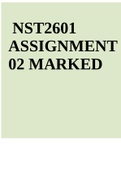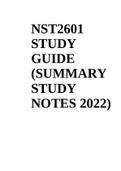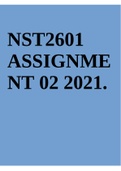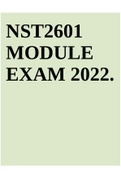Nst2601 (NST2601)
University of South Africa
Page 4 out of 46 results
Sort by

-
Mdlalose NST2601 Assignment 2.
- Exam (elaborations) • 8 pages • 2022
-
- R56,21
- + learn more
Mdlalose NST2601 Assignment 2. ZAMANYANDA XOLISILE MDLALOSE STUDENT NO: NST2601 ASSIGNMENT 2 UNIQUE NO: DECLARATION FORM I (full names): Zamanyanda Xolisile Mdlalose Student number: Module: NST2601 Declare that... 1. I understand what plagiarism entails and am aware of the University’s policy in this regard. 2. I declare that this assignment is my own, original work. Where I used someone else’s work, whether a printed source, the internet, or any other source, I give the prop...

-
NST2601 ASSIGNMENT 02 2021.
- Exam (elaborations) • 7 pages • 2022
-
- R58,08
- + learn more
NST2601 ASSIGNMENT 02 2021. QUESTION 1 Colonization Colonization refers to the large-scale population movements where migrants maintain strong links with their or their ancestors’ former country, gaining significant privileges over other inhabitants of the territory by such links. When colonization takes place under the protection of colonial structures, it may be termed settler colonialism. This often involves the settlers dispossessing indigenous inhabitants, or instituting legal and o...

-
NST2601 ASSIGNMENT 02 MARKED.
- Exam (elaborations) • 7 pages • 2022
-
- R59,95
- + learn more
NST2601 ASSIGNMENT 02 MARKED. QUESTION 1 Colonization This stage does not refer necessarily to the time of colonial occupation in Africa but rather to the stage when indigenous knowledge was not recognized as valued knowledge. In many Southern African countries such as Mozambique, gaining political independence did not create immediately an open and official curriculum place for indigenous knowledge. For many African countries, indigenous knowledge remained unofficial and was considered su...

-
NST2601 ASSIGNMENT 02 MARKED.
- Exam (elaborations) • 7 pages • 2022
-
- R59,95
- + learn more
NST2601 ASSIGNMENT 02 MARKED. QUESTION 1 Colonization This stage does not refer necessarily to the time of colonial occupation in Africa but rather to the stage when indigenous knowledge was not recognized as valued knowledge. In many Southern African countries such as Mozambique, gaining political independence did not create immediately an open and official curriculum place for indigenous knowledge. For many African countries, indigenous knowledge remained unofficial and was considered ...

-
NST2601 STUDY GUIDE (SUMMARY STUDY NOTES 2022)
- Other • 74 pages • 2022
-
- R59,95
- + learn more
NST2601 STUDY GUIDE (SUMMARY STUDY NOTES 2022) This is a complete and an all-inclusive guide to NST2601 STUDY GUIDE (SUMMARY STUDY NOTES 2022) Science in the context of society and the environment I. SCIENTISTS PAST AND PRESENT The history of science is full of great works that have marked a turning point in the development of a branch of knowledge, and in which the proposals for a new theoretical frame of reference or a new systematization of the known facts were preceded by an...

-
NST2601 MODULE EXAM 2022.
- Exam (elaborations) • 10 pages • 2022
-
- R58,08
- + learn more
NST2601 MODULE EXAM 2022. Indigenous Knowledge Systems (IKS) (2) - Indigenous knowledge systems are developed by a community as opposed to the scientific knowledge that is usually referenced to as ‘modern’ knowledge. According to Hoppers (2002, p. 8), the “system” imputed to indigenous knowledge in some circumstances alludes to merging of numerous features of the indigenous knowledge of indigenous people. b) Traditional Ecological Knowledge (TEK) (2) - Traditional Ecological Kno...

-
NST2601 ASSIGNME NT 02 2021.
- Exam (elaborations) • 7 pages • 2022
-
- R59,95
- + learn more
NST2601 ASSIGNME NT 02 2021. Colonization Colonization refers to the large-scale population movements where migrants maintain strong links with their or their ancestors’ former country, gaining significant privileges over other inhabitants of the territory by such links. When colonization takes place under the protection of colonial structures, it may be termed settler colonialism. This often involves the settlers dispossessing indigenous inhabitants, or instituting legal and other stru...

-
NST2601 ASSIGNMENT 02 MARKED
- Exam (elaborations) • 7 pages • 2022
-
- R59,95
- + learn more
NST2601 ASSIGNMENT 02 MARKED. Colonization This stage does not refer necessarily to the time of colonial occupation in Africa but rather to the stage when indigenous knowledge was not recognized as valued knowledge. In many Southern African countries such as Mozambique, gaining political independence did not create immediately an open and official curriculum place for indigenous knowledge. For many African countries, indigenous knowledge remained unofficial and was considered superstitious...
NST2601 STUDY GUIDE (SUMMARY STUDY NOTES 2022) This is a complete and an all-inclusive guide to Nst2601

-
NST2601 MODULE EXAM 2022.
- Exam (elaborations) • 10 pages • 2022
-
- R56,21
- 2x sold
- + learn more
NST2601 MODULE EXAM 2022. In your own words, explain what you understand by the following terms: (12) a) Indigenous Knowledge Systems (IKS) (2) - Indigenous knowledge systems are developed by a community as opposed to the scientific knowledge that is usually referenced to as ‘modern’ knowledge. According to Hoppers (2002, p. 8), the “system” imputed to indigenous knowledge in some circumstances alludes to merging of numerous features of the indigenous knowledge of indigenous people...

Did you know that on average a seller on Stuvia earns R4500 per month selling summaries? Hmm, hint, hint. Discover all about earning on Stuvia



